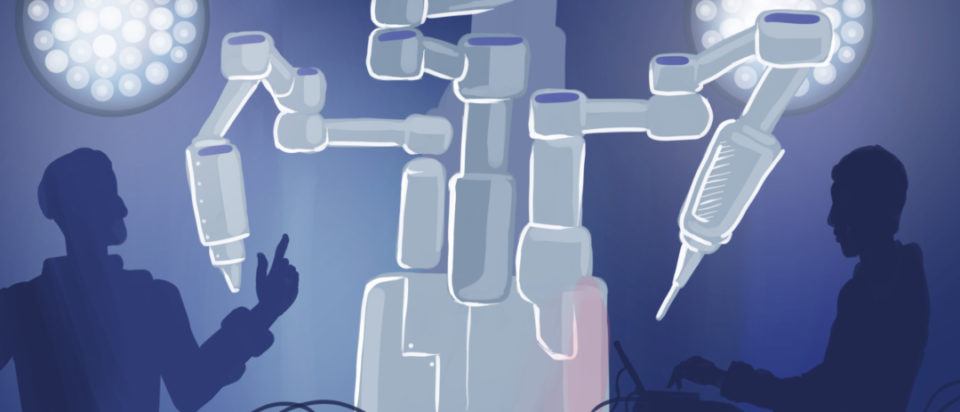Harnessing the power of artificial intelligence (AI) provides enticing opportunities that could transform the medical field.
read more – copyright by thevarsity.ca
 Artificial intelligence is undergoing a moment of zeitgeist. From the hosts of Westworld to Turing-tested humanoid Ava from Ex Machina , the paranoid references to its possibilities and horrors are exploited in cinema. Siri, Cortana, and self-driving cars are perhaps popular, practical examples of the technology in use.
Artificial intelligence is undergoing a moment of zeitgeist. From the hosts of Westworld to Turing-tested humanoid Ava from Ex Machina , the paranoid references to its possibilities and horrors are exploited in cinema. Siri, Cortana, and self-driving cars are perhaps popular, practical examples of the technology in use.
In September, U of T Professor Emeritus Geoffrey Hinton and President Emeritus David Naylor both published articles in the Journal of the American Medical Association on deep learning and its potential to transform medicine.
Hinton, who is also a vice-president and engineering fellow at Google, distilled intricate aspects of deep learning in his article, while Naylor explored prospects for machine learning in health care in his.
At U of T, Canada Research Chair in Robots for Society and Associate Professor Goldie Nejat and her team develop socially assistive robots to aid seniors, and Professor Shahrokh Valaee uses AI and artificial X-rays to pinpoint diseases.
“I believe in artificial intelligence in the long run,” said Dr. Franz Rudzicz. “I believe there is a future out there where you’ll have something like Echo in your house and Echo itself could diagnose you.”
Rudzicz is an Associate Scientist at the International Centre for Surgical Safety of the Li Ka Shing Knowledge Institute at St Michael’s Hospital and also a faculty member at the Vector Institute for Artificial Intelligence.
He is among a number of researchers working to use AI to transform the practice of medicine.At the Speech and Oral Communication lab (SPOClab), Rudzicz’s team of researchers investigate machine learning and natural language processing for use in health care practices.Their aim is to use data to produce software that helps individuals with disabilities communicate.
Thank you for reading this post, don't forget to subscribe to our AI NAVIGATOR!
“We’re interested in the whole mechanism of speech and language processing. From the acoustics in speech, to how it is physically produced by the articulators, to how it’s produced in the brain,” said Rudzicz.
In the short term, Rudzicz sees the speech recognition technology as being a Google search for physicians, providing them with relevant medical information on their patient’s history.
It could help reduce the clerical burden for physicians by providing a transcription of communication with patients and integrating that with their electronic medical record.[…]
read more – copyright by thevarsity.ca


Harnessing the power of artificial intelligence (AI) provides enticing opportunities that could transform the medical field.
read more – copyright by thevarsity.ca
In September, U of T Professor Emeritus Geoffrey Hinton and President Emeritus David Naylor both published articles in the Journal of the American Medical Association on deep learning and its potential to transform medicine.
Hinton, who is also a vice-president and engineering fellow at Google, distilled intricate aspects of deep learning in his article, while Naylor explored prospects for machine learning in health care in his.
At U of T, Canada Research Chair in Robots for Society and Associate Professor Goldie Nejat and her team develop socially assistive robots to aid seniors, and Professor Shahrokh Valaee uses AI and artificial X-rays to pinpoint diseases.
“I believe in artificial intelligence in the long run,” said Dr. Franz Rudzicz. “I believe there is a future out there where you’ll have something like Echo in your house and Echo itself could diagnose you.”
Rudzicz is an Associate Scientist at the International Centre for Surgical Safety of the Li Ka Shing Knowledge Institute at St Michael’s Hospital and also a faculty member at the Vector Institute for Artificial Intelligence.
He is among a number of researchers working to use AI to transform the practice of medicine.At the Speech and Oral Communication lab (SPOClab), Rudzicz’s team of researchers investigate machine learning and natural language processing for use in health care practices.Their aim is to use data to produce software that helps individuals with disabilities communicate.
Thank you for reading this post, don't forget to subscribe to our AI NAVIGATOR!
“We’re interested in the whole mechanism of speech and language processing. From the acoustics in speech, to how it is physically produced by the articulators, to how it’s produced in the brain,” said Rudzicz.
In the short term, Rudzicz sees the speech recognition technology as being a Google search for physicians, providing them with relevant medical information on their patient’s history.
It could help reduce the clerical burden for physicians by providing a transcription of communication with patients and integrating that with their electronic medical record.[…]
read more – copyright by thevarsity.ca
Share this: